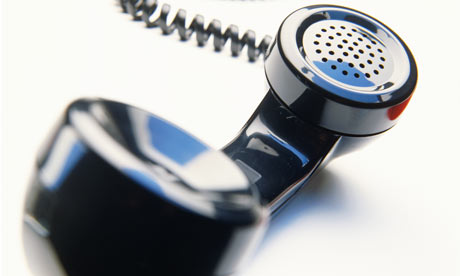To impress over the line, you need to be as enthusiastic and prepared as you would be face-to-face.
Helen Menhenett reveals how it's done

Selected from the guardian.co.uk, Monday 4 April 2011 09.30 BST
You might think that the best thing about a telephone interview is that, like a radio presenter, you don't have to worry about how you look.
But, an interview is still an interview even if you don't have to go to their offices. You need to be as prepared and well presented as you would be for a face to face interview.
Initial interviews by telephone are more common than they used to be. It's an inexpensive way to screen candidates in the initial stages of a recruitment campaign. The recruiter may just be looking for a confident manner and intelligent responses to some set questions. But don't take anything for granted. You may find you are on the phone for an hour and a half and are expected to answer detailed questions about previous roles and achievements.
Don't allow yourself to be caught on the hop. If you're not able to make some quiet time when they call then set a time for the interview to take place. You have to be a bit more organised about the telephone interview because it's on your home turf. Make sure you won't be interrupted and be sure to charge your phone in advance. Keep a copy of your CV by the phone and all the other relevant information you might need. Prepare and compose yourself in advance. If you sound confused and disorganised you might not get a second chance.
You should have some information from the prospective employer about the role and company. Think about answers you might give to their questions, particularly with regard to competency based questions. Do your research and prepare some questions to ask them exactly as you would for a regular interview.
Smile when you talk on the telephone. You'll be more relaxed, you'll sound more confident and assertive. Seriously think about using a headset for telephone interviews. Apart from the fact that it will make it much easier to take notes you'll be able to concentrate on the conversation rather than on balancing the phone between shoulder and ear while you search for a pen.
In all other respects treat the interview as you would a one to one but remember that time tends to be limited for a phone interview. It's a good idea to ask at the start, if not before the interview, about the structure or sequence of the interview process so you know what to expect. If part of the process is going to be that you are offered a choice of topics to brainstorm you don't want to be taken by surprise.
A phone interview is likely to feel less spontaneous and flexible than a one to one. The interviewer may well have a set script of questions and while you may feel rushed, at some points, if the interviewer thinks they have the information they need they will want to move on.
This is the tricky thing about the telephone interview - you can't judge reactions in the same way as when you are face to face with an interviewer. It's a little harder to engage the interviewer in a two-way conversation if she has a schedule of questions and a row of tick boxes. As you don't get the feedback or body language information that help in the face to face situation, it might be useful to ask questions such as "is that what you needed to know?" or "do you want me to go into more detail?"
Other things to bear in mind? Make sure you sound enthusiastic, the sort of person they want on the team. Pace yourself, a good interviewer knows you may need a little time to compose a good response, so do take time to think about answers. Be aware that they may be pushing you to answer as part of their interview technique. Listen carefully and if you don't fully understand the question, ask for clarification. Don't allow yourself to become flustered, especially if some of the questions seem either irrelevant or overly-specific. And remember the interview may need some time to make notes between questions so don't worry unduly about short silences, be patient.
Make sure you have the interviewer's email details so that after the interview ends you can write to them a thank you note, so as to reiterate your interest in the role and outline key points discussed and what you think you bring to the table.
Helen Menhenett is head of research at outplacement provider, Fairplace

5 comments:
The recruiter may just be looking for a confident manner and intelligent responses to some set questions. Business Voip
The recruiter may just be looking for a confident manner and intelligent responses to some set questions. But don't take anything for granted. Phone Systems Charlotte
A private branch exchange (PBX) phone system that's delivered as a hosted service, typically by one of the major telephone companies. Hosted Phone System
An IP PBX is a private branch exchange (telephone switching system within an enterprise) that switches calls between VoIP (voice over Internet Protocol or IP) users on local lines while allowing all users to share a certain number of external phone lines.IP-based PBX
Great articles and great layout. Your blog post deserves all of the positive feedback it’s been getting. 0800 mobile numbers
Post a Comment